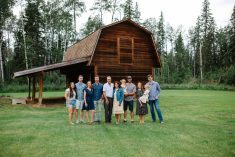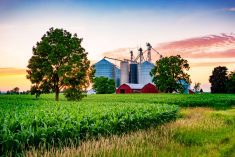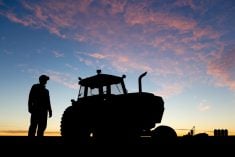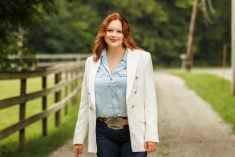Where can young farmers turn for help to figure out which pieces of the leadership puzzle to learn and when? And on top of all the facts and processes you must master as you step into an on-farm leadership role, how can you accumulate enough of the right insights and skills required? These three young farmers offer their advice.
– April Stewart, CG Associate Editor
The road is unexpectedly rough. Becoming a farm decision-maker and leader, not just one of the crew was always going to be a challenge and there’d be an absolute ton to learn. That much was clear, and these young farmers are definitely not naive. Their eyes are open. But still, this is tough.
Read Also

Part 4: Financial disagreements between farm siblings
A six-part series that looks at the challenges sibling conflict can have on the farm business and family business relationships.
Who knew, for instance, there’d be so little help figuring out which pieces of the leadership puzzle to learn when, or how to do it. Or how, on top of all the facts and all the processes you have to master, you go about accumulating all the insights and all the finesse it takes to manage a successful farm.
For a handful of young farmers, however, a possible strategy is emerging. It’s to form a future-oriented peer group composed of next-gen farmers in the same boat. As strategies go, is this one paying off? Is it a real help, or a glorified coffee club?
Swapping Notes
Brother and sister Aubrey Kolk and Ashley Stronks see the big challenge as they transition into the leadership of the family’s Alberta farm.
“It’s a lot of land and assets,” Stronks says “We have to figure out how to be good stewards of that.”
In today’s agriculture, as farmers across the country can appreciate, that’s a mouthful.
And that’s not all. As just one example, the pair can see it would be a great help to learn more about the farm’s human resources side.
Other young farmers, though, must be working their way through such issues, and maybe they’d have something they could learn from Kolk and Stronks as well. But how do you find them? And how do you connect?
It’s a thought process that led Kolk and Stronks to say yes to the concept behind the Emerging Farm Managers Peer Group started in 2021 by Backswath Management.
“It sounded like a good way of being in contact with other young farmers in Canada and seeing what challenges other people across the nation were having,” Kolk says. “And we were hoping to learn a little more financial fluency, and more planning.”
“The finances,” Stronks picks up. “Our dad has a head for it and he’s taken some training as well, but he’s not always passing that information on. He does a great job but we just need to be confident in that with the business.
“We have to keep an eye on our ratios so we are able to go in the right direction.”
The brother and sister team aren’t alone. Regina-area grain and oilseed producer Parker Schikowski is also a member of the emerging leaders group and looking for high-value opporlunities to compare notes with other farmers on transition journeys of their own.
“I wanted to meet like-minded people that were in the same situation as I am dealing with, working with family, because that’s not always easy, navigating that relationship with your parents,” Schikoswki says.
“It’s interesting to hear how everybody’s doing that.”
Ongoing learning
Kolk and Stronks are the fourth generation on the farm, now 4,500 acres of mainly irrigated grain and oilseeds about 45 minutes northeast of Lethbridge, and they have begun the transition from their parents John and Laura.
Stronks, who is 40, has a degree in animal science from the University of Alberta and worked at the Lethbridge Research Station until she had children, followed by 16 years on contract with proAction, a national dairy quality assurance program.
With their four children, she and husband Landen live about half an hour from the farm, and she came back to it to work part-time in 2018, switching to full-time last year.
After graduating high school, Kolk (35 and married to Gabi with two young children) earned his millwright ticket while working for a feed mill company and then coming back to the farm full-time 13 years ago.
The family have been in the transition process for about seven years, and as with so many farms, this one has its peculiarities. In this case, it’s because the farm enterprise as it exists today is fairly new.
“Our land farm is quite young … so there’s a bit more debt,” Stronks says. “We are a relatively new farm that way.”
The operation started as a mixed farm run by their great-grandfather and then grandfather but then became a broiler chicken, cow-calf and feedlot operation until 2007, which was when their dad and uncle, who were running it at the time, decided to split the farm, with the uncle continuing to run a feedlot and their dad transitioning into grains and oilseeds.
So, already seven years into their transition process, Kolk and Stronks didn’t just wake up to the fact that financial management will be crucial to their success. Instead, the two now see the peer group as a management development tool that complements the other steps they’ve already taken, such as the CTEAM program.
They have also taken Farm Management Canada training, and their parents expect them to check out any program or workshops that may be useful to them.
Schikowski also had support at home when he joined the emerging leader peer group, consistent with the family’s idea that a phone contact list can be one of the farm’s most valuable assets — one which the peer group can grow.
“I’ve learned from my grandfather and father that creating contacts is never a bad thing … have people to call and bounce ideas off,” Schikowski says.
Importantly, too, he sees the membership of this particular group as a good fit for him. “I am not in competition with anybody that is in the peer group,” Schikowski says. “And everybody’s in the same mindset of growing and making their farm better.”
Schikowski farms 19,000 acres of grains and oilseeds with his dad Darren. At age 28, he is the third generation on the farm, but his journey has been a little different than for a lot of young farmers. His grandparents started acquiring farmland in 1993 and began operating the farm in 2003 after his grandfather retired from his career as CFO at AgrEvo.
Although Schikowski spent a lot of time on the farm growing up, his first job was working for his dad’s janitorial company.
But when Schikowski became certain farming was what he wanted to do, his dad transitioned over to the farm and now they are very much in the transition phase.
Father Darren still manages the business side of the farm while Schikowski manages the day-to-day operations and they both have their own farm corporations that are working together as Schikowski builds up his equity towards purchasing the acres his dad still owns.
With that focus, Schikowski finds it is often the informal discussions with the other peer group members, outside of the business training sessions, that provide the biggest learnings.
“We talk about anything from different ways to borrow money to how to deal with employees,” Schikowski says. “I take all the information in and take it back to my farm and make it as beneficial to our farm as I can.”
Kolk and Stronks also find the informal conversations with their peers produce worthwhile insights, especially into relationships between the generations.
“It’s often about how do you deal with your parents, how do you transfer information,” Stronks says. “There are so many more similarities than differences. They are dealing with the same issues and challenges as we are. There’s a lot of things that unify us as farmers.”
Discussions among the peer group also drive home how difficult it can be to manage a business in a volatile industry.
“I’m still learning things … farming is different every year and it’s not always easy to navigate that,” Schikowski agrees. “You talk to farmers that have been in the business for 35 years and they’re still learning things every day. But that’s where I find the peer group to be so beneficial. Maybe a different farmer has dealt with something like what I’m dealing with, and that’s not published all the time or well-known, so you throw things out and say, hey, has anybody dealt with this and everybody’s super-open to help you. It’s been a huge benefit that way.”
The peer group has a reach beyond its members, often opening the door to insights that members glean from conversations with their parents or other contacts
In Schikowski’s case, the ripple effect often results in productive conversations with his dad about how they can tweak their numbers and improve their succession plan.
“We’ve always been pretty good with our books and knowing our numbers, but it’s interesting to learn from Backswath and the group members about different ways to look at your numbers and manipulate them to find out exactly if you can afford to do certain things on the farm,” Schikowski says. “It definitely sparks conversation between my dad and I.”
Back at home
Kolk and Stronks bring back ideas from the peer group and have found their parents are open to their taking the initiative. “It’s like they’re saying: ‘we’re trying to take our hands off the wheel and let you guys figure it out’,” Kolk says.
Not everything that the group discusses applies to everyone’s farm of course, but it’s still fascinating to discover the different ways that people manage their farms. As an example, one farmer in the group who owns a farm with multiple managers, explained how a management tree system identifies who deals with which issues on the farm.
“They have a lot of people managing different things on their farm which is completely different from my farm where pretty much everything goes through me,” Schikowsi says. “One of my biggest takeaways is how so many different farms can work so well and so differently but still get the same results and be successful.”
They also know their own farms will evolve.
For Kolk and Stronks, with two other siblings coming in, the plan is to remain future-focused. “It’s important to always be learning and thinking about things differently,” Kolk says. “To have that sounding board of different farmers through the provinces helps us to do that.” The goal is set, he says. “It’s to know how we can make this farm stable enough to stick around for the next three or four generations,” he says, and adds, “formalizing some parts of the farm will definitely help us get there.”
– This article was originally published as, ‘A smarter farm start’ in the October 2023 issue of Country Guide.
















